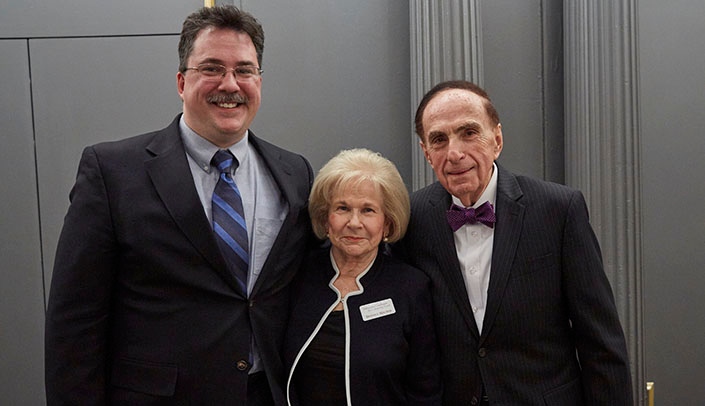It’s a form of cancer that’s every bit as deadly as pancreatic cancer — just not as common. It’s called cholangiocarcinoma, a cancer of the bile ducts that extend from the liver to the small intestine.
Previous honorees
- 2015 – David Mercer, M.D., Ph.D.
- 2016 – Tammy Kielian, Ph.D.
- 2017 – Rebecca Oberley-Deegan, Ph.D.
For the research team of Justin Mott, M.D., Ph.D., which includes a researcher and three graduate research assistants, cholangiocarcinoma has become their archenemy.
“It’s a weird tumor that’s understudied and needs attention,” said Dr. Mott, who is associate professor and medical assistant director, biochemistry and molecular biology. “There are less than a dozen labs with a major focus on this cancer.”
For his research on this rare form of cancer, Dr. Mott received the Chancellor Emeritus Harold M. Maurer, M.D. and Beverly Maurer Scientific Achievement Award on April 30 at the 16th Annual Spring Tribute Luncheon for the Nebraska Coalition for Lifesaving Cures at Happy Hollow Club.
The major function of the bile ducts is to move a fluid called bile from the liver and gallbladder to the small intestine, where the bile helps digest the fats in food.
The average survival time for someone with cholangiocarcinoma is 8-12 months. About 5 percent of patients make it five years. Among the notables who have succumbed to the disease are Walter Payton, former NFL great, and Chris LeDoux, country music singer/songwriter.
“We recently got a visit from a young cholangiocarcinoma patient and her family,” Dr. Mott said. “They were driven by curiosity to speak with researchers studying the disease. For these patients and their families, they want hope for future treatments.”
Dr. Mott has a five-year, $1.7 million grant from the National Cancer Institute to study cholangiocarcinoma. His team is trying to determine why bile, which is normally toxic to other cells, seems to increase the tumor’s ability to grow and survive.
The tumor cells appear to have protective proteins that are turned on by growth factors. Dr. Mott’s team is trying to identify a drug target that will allow them to “undercut this defense system.”
Dr. Mott earned his M.D. and Ph.D. degrees at St. Louis University. He joined UNMC in 2011. Since that time, he has published 18 manuscripts and a book chapter and received an Outstanding Teacher Award in 2017.
His nominator, Surinder Batra, Ph.D., professor and chair of biochemistry and molecular biology, ranks Dr. Mott “among the top translational scientists in his age group.”
“He is a force in the field of gastrointestinal cancers,” Dr. Batra said. “The work he is doing will have long-lasting impacts on cancer research, cancer initiation and progression, chemo-resistance, various treatments and prevention.”

Justin,
Congratulations again!
Carol Russell
Congratulations, Dr. Mott!
CONGRATULATIONS and well-deserved!!
Carol Casey
Congratulations, Justin, well deserved!
Ming-Fong
Congratulations Justin for a well deserved award! We are so proud of you and your accomplishments.
Thank you for all you do! Well deserved!
Congratulations Dr. Mott, a well-deserved award!